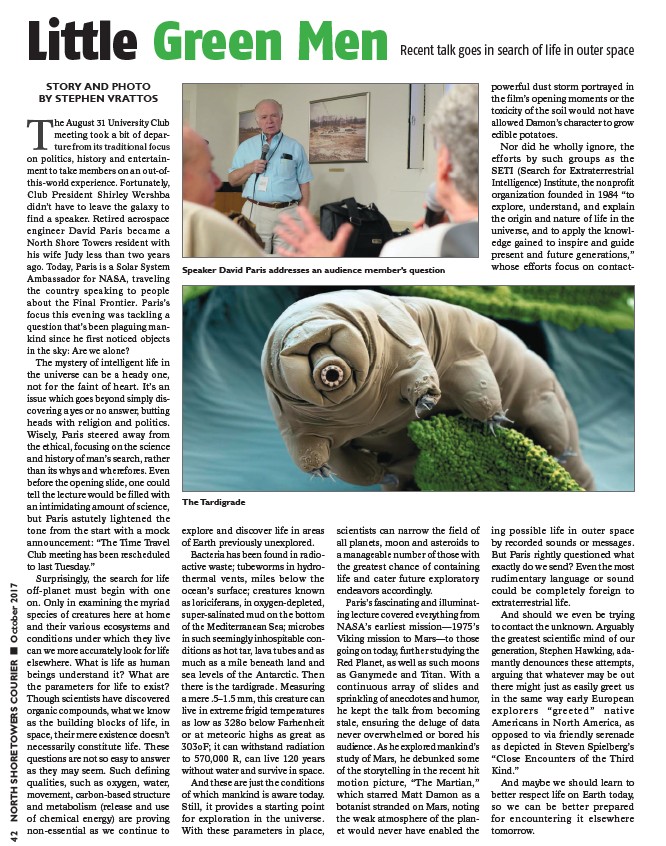
Little Green Men
STORY AND PHOTO
BY STEPHEN VRATTOS
The August 31 University Club
meeting took a bit of departure
from its traditional focus
on politics, history and entertainment
to take members on an out-ofthis
world experience. Fortunately,
Club President Shirley Wershba
didn’t have to leave the galaxy to
find a speaker. Retired aerospace
engineer David Paris became a
North Shore Towers resident with
his wife Judy less than two years
ago. Today, Paris is a Solar System
Ambassador for NASA, traveling
the country speaking to people
about the Final Frontier. Paris’s
focus this evening was tackling a
question that’s been plaguing mankind
since he first noticed objects
in the sky: Are we alone?
The mystery of intelligent life in
the universe can be a heady one,
not for the faint of heart. It’s an
issue which goes beyond simply discovering
a yes or no answer, butting
heads with religion and politics.
Wisely, Paris steered away from
the ethical, focusing on the science
and history of man’s search, rather
than its whys and wherefores. Even
before the opening slide, one could
tell the lecture would be filled with
an intimidating amount of science,
but Paris astutely lightened the
tone from the start with a mock
announcement: “The Time Travel
Club meeting has been rescheduled
to last Tuesday.”
Surprisingly, the search for life
off-planet must begin with one
on. Only in examining the myriad
species of creatures here at home
and their various ecosystems and
conditions under which they live
can we more accurately look for life
elsewhere. What is life as human
beings understand it? What are
the parameters for life to exist?
Though scientists have discovered
organic compounds, what we know
as the building blocks of life, in
space, their mere existence doesn’t
necessarily constitute life. These
questions are not so easy to answer
as they may seem. Such defining
qualities, such as oxygen, water,
movement, carbon-based structure
and metabolism (release and use
of chemical energy) are proving
non-essential as we continue to
explore and discover life in areas
of Earth previously unexplored.
Bacteria has been found in radioactive
waste; tubeworms in hydrothermal
vents, miles below the
ocean’s surface; creatures known
as loriciferans, in oxygen-depleted,
super-salinated mud on the bottom
of the Mediterranean Sea; microbes
in such seemingly inhospitable conditions
as hot tar, lava tubes and as
much as a mile beneath land and
sea levels of the Antarctic. Then
there is the tardigrade. Measuring
a mere .5–1.5 mm, this creature can
live in extreme frigid temperatures
as low as 328o below Farhenheit
or at meteoric highs as great as
303oF; it can withstand radiation
to 570,000 R, can live 120 years
without water and survive in space.
And these are just the conditions
of which mankind is aware today.
Still, it provides a starting point
for exploration in the universe.
With these parameters in place,
Recent talk goes in search of life in outer space
scientists can narrow the field of
all planets, moon and asteroids to
a manageable number of those with
the greatest chance of containing
life and cater future exploratory
endeavors accordingly.
Paris’s fascinating and illuminating
lecture covered everything from
NASA’s earliest mission—1975’s
Viking mission to Mars—to those
going on today, further studying the
Red Planet, as well as such moons
as Ganymede and Titan. With a
continuous array of slides and
sprinkling of anecdotes and humor,
he kept the talk from becoming
stale, ensuring the deluge of data
never overwhelmed or bored his
audience. As he explored mankind’s
study of Mars, he debunked some
of the storytelling in the recent hit
motion picture, “The Martian,”
which starred Matt Damon as a
botanist stranded on Mars, noting
the weak atmosphere of the planet
would never have enabled the
powerful dust storm portrayed in
the film’s opening moments or the
toxicity of the soil would not have
allowed Damon’s character to grow
edible potatoes.
Nor did he wholly ignore, the
efforts by such groups as the
SETI (Search for Extraterrestrial
Intelligence) Institute, the nonprofit
organization founded in 1984 “to
explore, understand, and explain
the origin and nature of life in the
universe, and to apply the knowledge
gained to inspire and guide
present and future generations,”
whose efforts focus on contacting
possible life in outer space
by recorded sounds or messages.
But Paris rightly questioned what
exactly do we send? Even the most
rudimentary language or sound
could be completely foreign to
extraterrestrial life.
And should we even be trying
to contact the unknown. Arguably
the greatest scientific mind of our
generation, Stephen Hawking, adamantly
denounces these attempts,
arguing that whatever may be out
there might just as easily greet us
in the same way early European
explorers “greeted” native
Americans in North America, as
opposed to via friendly serenade
as depicted in Steven Spielberg’s
“Close Encounters of the Third
Kind.”
And maybe we should learn to
better respect life on Earth today,
so we can be better prepared
for encountering it elsewhere
tomorrow.
Speaker David Paris addresses an audience member’s question
The Tardigrade
42 NORTH SHORE TOWERS COURIER ¢ October 2017